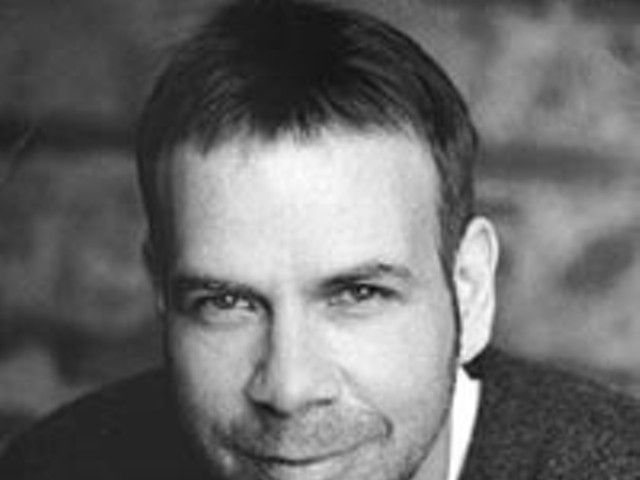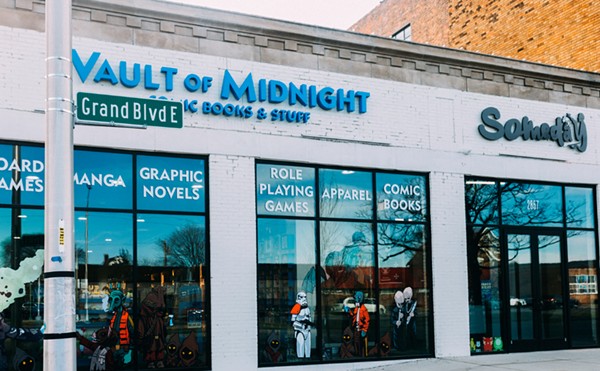Five nonfictional windows into pain, gain, process and people — they’ll be showing this weekend only in Ann Arbor, as the Madstone Theaters, in association with the New York Times, present the best of the Full Frame Documentary Film Festival.
“You know what a teacher does, but you don’t think about applying it to yourself until you start.” — Nate is only one of five rookie LA public school teachers whose experiences fuel The First Year, but his sentiment is true for all. Director Davis Guggenheim decided to explore the world of interracial, underfunded education when faced with deciding to send his kids to privileged private schools or troubled public schools. He reveals the teachers’ heartbreaking commitment, their maddening frustration stirred up by kids’ misbehavior and angry resistance, parents’ missed appointments and the occasional tiny miracle in this everyday labor of love.
It takes more than a great idea to catapult a successful Internet business. Startup.com is the tale of two big-business-bound high school buddies succumbing to the entrepreneurial lure of cash and conquest. Tom and Kaleil immerse themselves in a well-dressed land of all-nighters and ego trafficking with the potential to skyrocket to a luxury home or take the dreaded plunge into financial turmoil. It’s a business partnership that strangely parallels the first-kiss-to-aftermath of a love affair.
And for those who haven’t seen The Life and Times of Hank Greenberg, Full Frame gives us another welcome opportunity. Michigan native, writer-director Aviva Kempner strikes a perfect balance of food for the eye, ear and mind while exploring the exemplary life of an American baseball legend and Jewish ethnic groundbreaker. Kempner fuses music and memories with noir style, ’30s-vintage Detroit Tigers footage and not-so-stylish anti-Semitism, to give us the bat-and-ball sport in its prime. Life and Times is one of the best-crafted documentaries you’ll ever see.
Back in the ’60s, American airmen were kings of the heavens, until the Vietnam War plunged them into the barbaric depths of the human experience. But some survived the better for it. Return With Honor, by filmmakers Freida Lee Mock and Terry Sanders (Maya Lin: A Strong Clear Vision), has been given Tom Hanks’ personal and powerful stamp of approval. Rarely seen Vietnamese footage of American POWs is interwoven with devastating testimonies (including U.S. Sen. John McCain’s), while touching upon some less-than-honorable angles of government officials who thrust the United States into a murky war. Spit upon, stoned, stuck with bamboo slivers by children, tortured with ropes that dislocated limbs, for seven years or more the prisoner pilots battled insanity and isolation, communicating with intricate tapping codes between cells and holding onto their honor.
But the documentary that bites the hardest and deepest is The Two Towns of Jasper. On June 7, 1998, in Jasper, Texas, three white men (John King, Lawrence Brewer and Shawn Berry) beat a black man (James Byrd Jr.) and chained him to the back of a pickup truck, then dragged him until he was dead. Black director Marco Williams interviewed the black denizens with a black crew, and white director Whitney Dow interviewed the white denizens with a white crew. The result is controversially enlightening. The two directors with common backgrounds, who have been friends for more than 20 years, found that their perspectives were very different. Here are some of their thoughts about the film.
The draw
Whitney Dow: When I saw the report of what happened to James Byrd, it really shocked me and reminded me about something about our country we kind of hope is in the past ... it had the earmarks of an old-style lynching.
Marco Williams: This murder occurred in the last half of the last decade of the 20th century. I think there’s something within us as a nation that imagines that we are enlightened, that we’ve overcome the racial divide, and the fact that this did occur, and was more brutal than many others in recent memory, gave people immediate cause to pause and question and reflect.
The goal
Dow: To create a more functional language to talk about race across race. We both agreed that there wasn’t really constructive dialogue taking place. Many times cross-race dialogue is either angry shouting or some politically correct crap. If we give people the opportunity to vicariously listen in on what the other is saying and thinking, perhaps that might be a better form of communication.
Williams: To give voice to the voiceless, to provide an opportunity for a community to be heard ... wanting to tell the story of how this crime could have occurred in a town that was loosely 50 percent African-American, where the mayor was black and two of five city councilmen were black, so many things that would at least make one look at it and say, well, this is an example of how the races have come together.
Why now?
Dow: Black life has always had less value than white life in this country, whether it’s white-on-black crime or black-on-black crime. The district attorney in Jasper talked to me about how up until the mid-’70s, a black person was never prosecuted for killing another black person; they called it misdemeanor murder. One of the people [in Jasper] said, “James Byrd is not unusual — it’s just this time it got televised.”
Williams: The sheriff immediately got the FBI involved. It was on President Clinton’s watch. The media smelled blood and descended. It was a modern-day lynching, and so while there’ve been other racially motivated murders — police brutality — this was uncommonly inhumane, to chain a man by his ankles, pull his pants down and drag him over an asphalt road for three-plus miles.
Any regrets?
Williams: I don’t think that in any way did it magnify the fissure. It actually provided an opportunity for people to speak candidly and openly. It’s often a kind of liberal-mindedness that says, “Oh, we’re colorblind. We’re racially tolerant. There’s no intolerance. We all get along.” And that in my mind magnifies the fissure, because it doesn’t acknowledge our different viewpoints.
Dow: In effect, we had balanced it by having two people on either end of the seesaw. We had to share creative control; everything had to be accommodated. It was as if we were two halves of the same whole.
The results
In response to an overwhelming reaction to The Two Towns of Jasper, last month Ted Koppel hosted a nationally televised Jasper town meeting. Sometimes confusing, sometimes illuminating, the meeting was an unprecedented leap into a safe space to air perspectives, and indicates that maybe both sides of the racial divide are now ready to talk.
Dow: There’s an incredible hunger to address the problem in so many communities. We’ve shown this film all over the country. People are looking for a way to address the problem, black and white.
Williams: This was a hard story to tell. I feel that, in many ways, it does represent the nature of race relations in this country.
Don’t miss the Q&A with The Two Towns of Jasper directors Whitney Dow and Marco Williams at 7:30 p.m. on Saturday, March 1 (following the 6 p.m. showing), and at 3:30 p.m. Sunday, March 2 (following the 1:45 p.m. showing). Madstone Theaters are inside Briarwood Mall, Ann Arbor. For an updated schedule of Full Frame Documentary Festival events call 734-994-1000 or visit www.madstonetheaters.com.
Anita Schmaltz writes about film for Metro Times. E-mail her at




